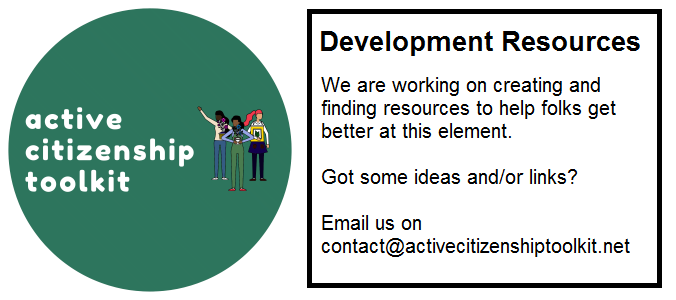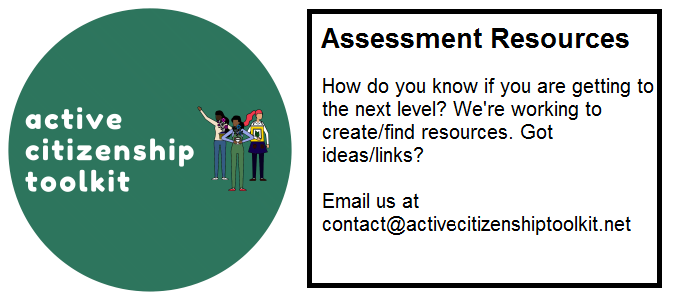Element Descriptor
Different people come with specific skills and motivations. Being able to find the right person for the right (usually unpaid) job, and present the work to them as an opportunity for warm-fuzzies or activist credibility tokens is a valuable skill. Not having it means you don’t get to tap into the broader ecosystem of potential supporters.
Level descriptors
| Novice | Practitioner | Expert | Ninja |
|---|---|---|---|
| You’re able to give new people – one at a time – a couple of options for getting involved in your project. If they aren’t interested in what you suggest, you point them to other groups | You’re able, following a plan, to give two or three people at a time the choice of a few jobs, and even ask them what they want to do, if none of the above fit. You make everyone feel welcome, including the ones who are probably “tourists” | You can turn the hostile into neutral/supporters, find small jobs for busy and underconfident people, offering different options at different times. You know that the same person at different times will have different availability, motivation etc, and you ride the roller coaster up and down… | You are able to enthuse and involve diverse people, some of whom have no time, others who have plenty. People who have no experience, people who have lots. You are able to buddy-up to create synergies. You are able to deal with doubts, conflicts and burnout/over-commitment without ever losing hope or cool |
Element Overview Essay
This is a draft. If something doesn’t make sense, or you see typos, or if you have further ideas, please email us on contact@activecitizenshiptoolkit.net
Introducing new members to an existing group is challenging because an existing group will have a way of working a set of practices, not all of them logical, not all of them explicitly enunciated. There will be habits. There’ll be shortcuts. Individuals who in the existing group will know each other’s strengths and weaknesses and hopefully their own. And they’ll also be a lot of in-jokes and references to prior events.
So for the new member, it can be quite intimidating. Everyone else is so much more up to speed on the issues everyone else seems to learn quickly, to like each other, everyone else seems to be able to coordinate and collaborate at three times the speed of sound, you know, “I blink and I miss it. I’ll never fit in. This is already a closed gang. Why am I here? They must be thinking that I’m not worth the time and energy and they’ve just chosen me to fill out the numbers or to meet ethnic or gender diversity quota. Those bastards.” And, you know, there are probably groups where that’s true. But I’m wanting to believe that if you’re reading this on the toolkit, you’re probably not that cynical,.
The consequences of this are stone-cold deadly. If you don’t bring new people into your group, it’s going to ossify, it’s going to stagnate. And if you can’t bring in new people, sooner or later, some of your core group people are gonna burn out. – hopefully not too easily, and you can avoid burnout. But you know, other stuff happens, their parents get sick, their kids need more attention. Their job needs more attention. They get a job in a different city. They get sick. They have a mental breakdown, unrelated to the burnout because this is a shitty, shitty world we’re living in. And mental breakdowns can happen to anyone. And it’s surprising, they don’t really happen to more people.
And once a group starts shrinking, then it starts being desperate. And it grabs the nearest warm body and it has even less capacity to bring in new people. And this is the key thing absorptive capacity which covers a multitude of a multitude of factors. I’ve made a YouTube video, but let’s talk about it in the sense of being able to absorb a new person into the group.
What is to be done? I think that this is probably I think group effort so
- Get two people introduced into the group at the same time, so there isn’t always “one newbie”.
- Invite the new people to write a fairly comprehensive “this is who I am” – biography, skills report for the other folks in core group to read, especially with the new persons “red button issues” that really piss me off (getting too many emails, other people turning up late, etc etc), and their previous experiences of groups that collapsed… and of course, “things I really LIKE, that increase my morale.”
- Have a “buddy system”, but make it clear that the new person can approach ANYONE for help.
- For the new people to have a one-off one-to-one with each of the other people in the core group, to hear abt them and also explain more/answer questions
- Design and update a “jargon buster sheet” so that the lingo and shorthand is written down, but also a rule that ANYONE can stop the meeting and say “does everyone understand this jargon” (and have one of the established people have it as their job. This is especially important in online situations, where it is harder to read body language/quizzicality.
- Within online meetings have a backchannel so they can ask what is going on without disturbing the flow (though they are welcome to do so)
- Buddy to check in on the new person ‘formally’ at 2,4, 6, 8 weeks and then monthly for 6 months.
Development Resources

Assessment Resources

